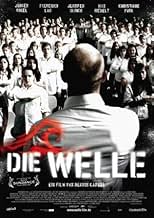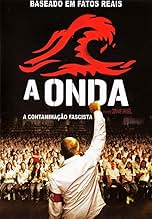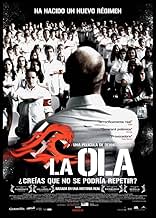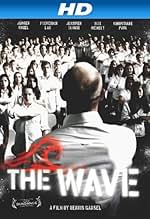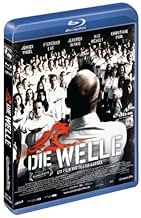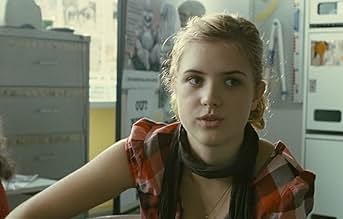VALUTAZIONE IMDb
7,6/10
119.451
LA TUA VALUTAZIONE
L'esperimento di un insegnante volto a dimostrare ai propri studenti cosa significa vivere in un regime di dittatura gli scappa terribilmente di mano quando crea un movimento sociale dotato ... Leggi tuttoL'esperimento di un insegnante volto a dimostrare ai propri studenti cosa significa vivere in un regime di dittatura gli scappa terribilmente di mano quando crea un movimento sociale dotato di vita propria.L'esperimento di un insegnante volto a dimostrare ai propri studenti cosa significa vivere in un regime di dittatura gli scappa terribilmente di mano quando crea un movimento sociale dotato di vita propria.
- Regia
- Sceneggiatura
- Star
- Premi
- 9 vittorie e 8 candidature totali
Recensioni in evidenza
"Die Welle" is an above average classroom drama with a political voice. Helmed by director Dennis Gansel, film is unforgiving in depicting the youth as a generation without anything to rebel about but loneliness, making them sensitive to any sort of illusion of belonging. Mostly a riveting affair, film lags in its second act as it jumps into Dawson's Creek. Film goes ashore into a memorable finale. Straight forward filming will captivate audiences, along with a pleasing cast.
Project week in a suburban high school entails them to study various forms of government and restriction. Rainer Wenger (Jürgen Vogel), an under-appreciated teacher finds a way in engaging his students. He cleverly manipulates his class to slap them out of apathy and disinterest with tiny minute changes which eventually builds up to a boil. Classroom scenes are stimulating as debates between the students are daring and engrossing writing mention controversial topics that are usually not spoken with lethargy. Film focuses on a group of smart people, highlighting further that what's bound to happen is even more tragic and rings a bell to what can happen out of celluloid..
Inspired by a 1960's social experiment in California documenting how easy it is to influence individuals, film looses track in its middle section as it begins to refocus on the individual lives of the students. Most characters seem to be run in the mill with general high school romance trouble, which would have been interesting but brings nothing new to the table. Stories work better as a collective rather than individuals, which further add to the intended effect. Some personalities shine though: students who never had any sense of belonging are indeed looked at with much heartbreak here as this false sense of security is embraced by them, motivating them to go a step further in preserving the society.
Finale is spellbinding as even if it diverts a lot from the actual experiment, it still proves as a necessity to further establish a point. Film parallels to the effect of Third Reich within its members and climax reminds audiences of the Bruno Ganz header "Der Untergang", as it clearly parallels the extent of loyalties that may arise in such occasions. From the get go, death of a character is imminent and even with its shock value, it justifies itself as beyond a plot device.
As an ensemble, the acting here is impermeable as they all deliver solid performances. Vogel especially convey solid work as the teacher. He brings gravity and his semi-bald haircut proves ominous. It's a shame that audiences lose connection to him midway though as he suddenly becomes the background to the melodrama.
German setting of the movie elevates the film's status. It creates this palpable undercurrent, that even with a country that already identifies itself as guilty; it still cannot escape the possibility of anarchy. Even if the picture becomes stern with its themes, it still is digestible to the mainstream. Word of mouth can secure a life outside the tills.
Project week in a suburban high school entails them to study various forms of government and restriction. Rainer Wenger (Jürgen Vogel), an under-appreciated teacher finds a way in engaging his students. He cleverly manipulates his class to slap them out of apathy and disinterest with tiny minute changes which eventually builds up to a boil. Classroom scenes are stimulating as debates between the students are daring and engrossing writing mention controversial topics that are usually not spoken with lethargy. Film focuses on a group of smart people, highlighting further that what's bound to happen is even more tragic and rings a bell to what can happen out of celluloid..
Inspired by a 1960's social experiment in California documenting how easy it is to influence individuals, film looses track in its middle section as it begins to refocus on the individual lives of the students. Most characters seem to be run in the mill with general high school romance trouble, which would have been interesting but brings nothing new to the table. Stories work better as a collective rather than individuals, which further add to the intended effect. Some personalities shine though: students who never had any sense of belonging are indeed looked at with much heartbreak here as this false sense of security is embraced by them, motivating them to go a step further in preserving the society.
Finale is spellbinding as even if it diverts a lot from the actual experiment, it still proves as a necessity to further establish a point. Film parallels to the effect of Third Reich within its members and climax reminds audiences of the Bruno Ganz header "Der Untergang", as it clearly parallels the extent of loyalties that may arise in such occasions. From the get go, death of a character is imminent and even with its shock value, it justifies itself as beyond a plot device.
As an ensemble, the acting here is impermeable as they all deliver solid performances. Vogel especially convey solid work as the teacher. He brings gravity and his semi-bald haircut proves ominous. It's a shame that audiences lose connection to him midway though as he suddenly becomes the background to the melodrama.
German setting of the movie elevates the film's status. It creates this palpable undercurrent, that even with a country that already identifies itself as guilty; it still cannot escape the possibility of anarchy. Even if the picture becomes stern with its themes, it still is digestible to the mainstream. Word of mouth can secure a life outside the tills.
An amiable German social sciences teacher has to teach his children about an autocratic government. The children at first seem bored, not wanting to hear any more about The Third Reich and Nazism. The teacher is surprised. "We're too knowledgeable to ever fall into something like that again," say the students. The teacher then decides to show the children what it's like to live in an autocracy, and sets up a simple experiment in class. They elect a leader (him) and he begins to instill in them (merely as an example) the virtues and practices that accompany an autocracy ("Strength through discipline", "Work as one"). The students take to it, and become obsessed with it. Soon, what was a simple classroom experiment grows to a social entity all it's own, with the teacher not sure if he can reverse the effects.
The film was very well acted and written, and was seriously creepy. It showed how - easily a society could fall into fascism, if presented to the society in the correct way. Watching the film, I understood why the students enjoyed the new system, but was also privy to the horrors that come with it. A shocking and powerful film. The way the different children reacted and how such a seemingly innocent experiment profoundly affected their lives was incredible and horrifying. Vogel gives a powerful performance as an idealistic teacher who isn't aware of the influence he has on others. Worth seeing.
The film was very well acted and written, and was seriously creepy. It showed how - easily a society could fall into fascism, if presented to the society in the correct way. Watching the film, I understood why the students enjoyed the new system, but was also privy to the horrors that come with it. A shocking and powerful film. The way the different children reacted and how such a seemingly innocent experiment profoundly affected their lives was incredible and horrifying. Vogel gives a powerful performance as an idealistic teacher who isn't aware of the influence he has on others. Worth seeing.
That's what the title "Die Welle" means. A teacher makes an experiment. He wants his class to understand what autocracy means. It starts with them stopping calling him by first name. Then they have to rise while addressed. Then, there are uniforms and a special saluting. And then, it runs out of control.
The most disturbing thing is that the teacher slowly loses control over himself, until there is a disaster.
OK, does it take a week to form young people to fascists? That's not the point. How ever long it takes, the interesting answer here is that it is possible at all. Do we run that risk too? Well, if you look into yourself, you maybe won't find a fascist, but you'll probably find someone who wants to be a part of something. Whatever it is.
The most disturbing thing is that the teacher slowly loses control over himself, until there is a disaster.
OK, does it take a week to form young people to fascists? That's not the point. How ever long it takes, the interesting answer here is that it is possible at all. Do we run that risk too? Well, if you look into yourself, you maybe won't find a fascist, but you'll probably find someone who wants to be a part of something. Whatever it is.
Die Welle details how a project on autocracy gradually leads to disastrous results. Initially without enthusiasm to teach the topic, Rainer Wegner conducts an unorthodox experiment to demonstrate to his students (equally lukewarm to start with) what life would be like under fascism. Neatly structured by days, the experiment begins with simple disciplines and grows to become an exclusive cult named "the wave" with its own uniform and salute.
Similar to his 2004 film "Before the Fall" which concerns the Nazi's seduction of youth, Dennis Gansel probes the individual psychologies that bring about uncontrollable collective movement, and how personal life is transformed by it. It offers a balanced view on an organisation like "The Wave" by enquiring whether it is a crystallisation of the students' class-free utopia (at the cost of losing individuality) or a community for those in need of belonging and empowerment.
What is frightening is that many (though not all) of them voluntarily follow the conformity through reasoning. Ironically, the mob mentality engulfing the students is what they condemn formerly; even the "anarchist" Rainer finds himself intoxicated with his increasingly idolised status.
An engaging and powerful film with a sense of humour, suspension (terror arises when the light goes off during Karo's anti-Wave poster distribution), twist (Rainer's concluding speech), believable characterisation and excellent acting (Jürgen Vogel, Max Riemelt, and Frederick Lau). Inspired by a true event in California , this intelligent film merits attention particularly because of its non-preaching and humanistic treatment of a heavy subject.
Similar to his 2004 film "Before the Fall" which concerns the Nazi's seduction of youth, Dennis Gansel probes the individual psychologies that bring about uncontrollable collective movement, and how personal life is transformed by it. It offers a balanced view on an organisation like "The Wave" by enquiring whether it is a crystallisation of the students' class-free utopia (at the cost of losing individuality) or a community for those in need of belonging and empowerment.
What is frightening is that many (though not all) of them voluntarily follow the conformity through reasoning. Ironically, the mob mentality engulfing the students is what they condemn formerly; even the "anarchist" Rainer finds himself intoxicated with his increasingly idolised status.
An engaging and powerful film with a sense of humour, suspension (terror arises when the light goes off during Karo's anti-Wave poster distribution), twist (Rainer's concluding speech), believable characterisation and excellent acting (Jürgen Vogel, Max Riemelt, and Frederick Lau). Inspired by a true event in California , this intelligent film merits attention particularly because of its non-preaching and humanistic treatment of a heavy subject.
Die Welle (The Wave) is truly a brilliant tale that lures viewers into its cleverly developed plot just as Herr Wenger lures his unsuspecting students into a sense of fascism. When Wenger, an affable schoolteacher who seems to be rebellious towards traditional instruction, gets selected to teach a class on autocracy, he is upset. However, he soon devises a plan with which to teach the students a valuable lesson on the sheer dangers of fascism and the ease with which one can be lured into it.
His class starts out simple and nonthreatening. The students choose Wenger as their leader and are instructed to wear a uniform and create a name for themselves (the students choose Die Welle "The Wave"). But, this club slowly turns into a sort of fascist regime. The unsuspecting students think they are participating in some sort of fun club, but they are really being shown how easily impressionable people can be attracted by autocracy.
The biting irony of this film is that at the beginning of the autocracy class, Wenger touched on the subject of Hitler's reign, and the students almost instinctively spit out answers about how Germany would never fall into that trap again knowing what they know now. But, the children soon eat their words when they become members of a much less disturbing, yet frighteningly similar clique.
There is a glimmer of this fact when two students who aren't members of "The Wave" pick on a student who is. Two other members come to the rescue of the victim. Though many may view this as a positive aspect of this sort of togetherness, the point is that fascism has developed and can easily become corrupt.
I highly recommend this to any potential viewer who either holds the same views as the students at the beginning of the film or simply wants to be entertained by the ironic theme of the film (so long as you don't mind the subtitles).
His class starts out simple and nonthreatening. The students choose Wenger as their leader and are instructed to wear a uniform and create a name for themselves (the students choose Die Welle "The Wave"). But, this club slowly turns into a sort of fascist regime. The unsuspecting students think they are participating in some sort of fun club, but they are really being shown how easily impressionable people can be attracted by autocracy.
The biting irony of this film is that at the beginning of the autocracy class, Wenger touched on the subject of Hitler's reign, and the students almost instinctively spit out answers about how Germany would never fall into that trap again knowing what they know now. But, the children soon eat their words when they become members of a much less disturbing, yet frighteningly similar clique.
There is a glimmer of this fact when two students who aren't members of "The Wave" pick on a student who is. Two other members come to the rescue of the victim. Though many may view this as a positive aspect of this sort of togetherness, the point is that fascism has developed and can easily become corrupt.
I highly recommend this to any potential viewer who either holds the same views as the students at the beginning of the film or simply wants to be entertained by the ironic theme of the film (so long as you don't mind the subtitles).
Lo sapevi?
- QuizBased on the novel "The Wave" by Todd Strasser (under the pen name Morton Rhue), a fictionalized account of the "Third Wave" teaching experiment by Ron Jones that took place in a Cubberley High School history class in Palo Alto, California in April 1967.
- BlooperAlthough set somewhere in western Germany, all policemen wear insignia of the state of Berlin.
- Citazioni
Rainer Wenger: So you don't think there could be another dictatorship in Germany?
Jens: No, we are too enlightened now.
- Curiosità sui creditiOpening and closing credits appear as graffiti.
- ConnessioniFeatured in Die Johannes B. Kerner Show: Episodio datato 12 marzo 2008 (2008)
- Colonne sonoreRock 'n' Roll High School
Written by Joey Ramone, Johnny Ramone and Dee Dee Ramone
Performed by EL*KE
Produced by Mirko Schaffer
©1980 WB Music Corp. and Taco Tunes
I più visti
Accedi per valutare e creare un elenco di titoli salvati per ottenere consigli personalizzati
- How long is The Wave?Powered by Alexa
Dettagli
Botteghino
- Budget
- 5.000.000 € (previsto)
- Lordo in tutto il mondo
- 32.350.637 USD
- Tempo di esecuzione
- 1h 47min(107 min)
- Colore
- Mix di suoni
- Proporzioni
- 2.35 : 1
Contribuisci a questa pagina
Suggerisci una modifica o aggiungi i contenuti mancanti





